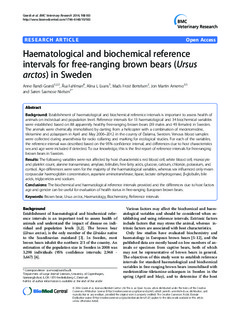Haematological and biochemical reference intervals for free-ranging brown bears (Ursus arctos) in Sweden
Græsli, Anne Randi; Fahlman, Åsa; Evans, Alina L.; Bertelsen, Mads Frost; Arnemo, Jon Martin; Nielsen, Søren Saxmose
Journal article, Peer reviewed
Permanent lenke
http://hdl.handle.net/11250/276746Utgivelsesdato
2014Metadata
Vis full innførselSamlinger
Originalversjon
Græsli, A. R., Fahlman, Å., Evans, A., Bertelsen, M. F., Arnemo, J. M., & Nielsen, S. S. (2014). Haematological and biochemical reference intervals for free-ranging brown bears (Ursus arctos) in Sweden. BMC Veterinary Research, 10, 9. doi: 10.1186/s12917-014-0183-x 10.1186/s12917-014-0183-xSammendrag
Background:
Establishment of haematological and biochemical reference intervals is important to assess health of
animals on individual and population level. Reference intervals for 13 haematological and 34 biochemical variables
were established based on 88 apparently healthy free-ranging brown bears (39 males and 49 females) in Sweden.
The animals were chemically immobilised by darting from a helicopter with a combination of medetomidine,
tiletamine and zolazepam in April and May 2006
–
2012 in the county of Dalarna, Sweden. Venous blood samples
were collected during anaesthesia for radio collaring and marking for ecological studies. For each of the variables,
the reference interval was described based on the 95% confidence interval, and differences due to host characteristics
sex and age were included if detected. To our knowledge, this is the first report of reference intervals for free-ranging
brown bears in Sweden.
Results:
The following variables were not affected by host characteristics: red blood cell, white blood cell, monocyte
and platelet count, alanine transaminase, amylase, bilirubin, free fatty acids, glucose, calcium, chloride, potassium, and
cortisol. Age differences were seen for the majority of the haematological variables, whereas sex influenced only mean
corpuscular haemoglobin concentration, aspartate aminotransferase, lipase, lactate dehydrogenase,
β
-globulin, bile
acids, triglycerides and sodium.
Conclusions:
The biochemical and haematological reference intervals provided and the differences due to host factors
age and gender can be useful for evaluation of health status in free-ranging European brown bears
